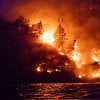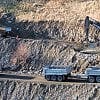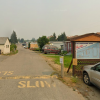KelownaNow reached out to all Member of Parliament candidates running in the 2015 Federal Election in the Kelowna-Lake Country riding and asked them questions pertaining to their electoral district.
Responses received from those running in the Kelowna-Lake Country riding will be posted live on KelownaNow.com between August 31st and September 4th in a randomly selected order.

1. Why are you best suited to represent our region federally?
I first moved to Kelowna in 1992, and now I enjoy raising my seven-year-old son here. As a younger person I worked in wineries in the Okanagan, in restaurants, in local museums, and in retail. My son goes to public school in Kelowna and I am active in community events and volunteering.
In recent years, as Chair of the Interdisciplinary Studies department at Okanagan College, I’ve proven I have management and leadership skills. My PhD studies taught me the discipline required to complete a large research project, and my research about B.C. interior resource industries and climate change gives me a deeper understanding of some of the challenges our communities face. As a college teacher, I know how to communicate, how to listen, and how to work hard. I represent NDP values of living within one’s means, working hard, and caring for my community.
2. What is your stance on legalizing marijuana in Canada?
New Democratic Party of Canada has had the same stance on marijuana for four decades: we believe that possession should not be a criminal offense, and we will move immediately to eliminate laws prohibiting the possession of marijuana.
I agree completely with this policy as evidence shows that marijuana is far less harmful than other legal substances, including alcohol and tobacco. We need a science-based approach to addiction, including accessible counselling and treatment, as well as a renewed commitment to providing public mental health services. People should be informed of the risks associated with consuming drugs and alcohol, based on scientific evidence.
3. What is your long-term plan to ensure invasive mussels do not enter the region?
Invasive zebra mussels threaten our ecology and our tourism industry. My brother is currently working as an Auxiliary Conservation Officer – Aquatic Invasive Species Prevention, checking boats as they enter B.C. His job is an example of the important work we need to see funded across B.C. and Canada. We need Environment Canada and the Department of Fisheries and Oceans to be fully funded so that their scientists, researchers and officers are free to protect our lands and waters, and to keep our communities and economies strong. Under Harper the DFO and Environment Canada have been censored and hampered; the NDP recognizes that a strong natural resource and tourism economy requires responsible stewardship and would be a full partner in that stewardship. I support science-based policy.
4. How are you planning on building and maintaining a political relationship with local First Nations?
Way'. In Kelowna-Lake Country we are on Syilx territory.
This year, 2015, is the Year of Truth and Reconciliation, and the TRC has issued a strong report with clear guidelines for all Canadians working towards the goal of healing our relationship with First Nations peoples. This relationship has been scarred by what Chief Justice Beverley MacLachan has described as "cultural genocide." The legacy of residential schools is with us still, and the result is that Canada's aboriginal peoples are far more likely to suffer illnesses, poverty, and be put in jail. This is the direct result of a government that has consistently failed to meet its basic obligations to First Nations. The Parliamentary Budget Officer has calculated that the Department of Aboriginal Affairs has simply failed to disburse over $1 billion in funding that was pledged to First Nations communities, as one sad example.
I have made a positive relationship with the Syilx WFN and OKIB, as well as the Metis community, a priority of my campaign. In August, an elder from the Westbank First Nation smudged our campaign office and spoke to us about Syilx culture. I am learning about the issues that the Syilx Nations and the Metis community would like to be taken forward in this federal election.
The Harper government is ignoring the United Nations, the Union of BC Indian Chiefs, the Native Women’s Association of Canada, and our premiers in refusing to conduct an inquiry into the more than 1,000 Murdered and Missing Indigenous Women across Canada. Many of these women and girls have been lost to communities in B.C., and I am committed, along with all NDP candidates, to launching an inquiry within the first 100 days of forming government.
With an NDP government, 2015 will mark the beginning of a new nation-to-nation relationship between the federal government and our First Nations.

5. How will your party support the provincial/national economy? Do you think the Canadian economy is slumping into a recession?
The Parliamentary Budget Officer and many major banks have said clearly that Canada is officially in a recession – the definition of which is two straight quarters of negative growth. This was a preventable recession, caused by Stephen Harper’s Conservatives becoming overwhelmingly fixated on oil as our primary export resource. And now that oil has slumped below $40 per barrel, the “balanced budget” Finance Minister Joe Oliver produced is anything but, and the Canadian dollar has fallen to below 76 cents U.S. This means groceries, vacations, and all imported goods are much more expensive, pricing Canadian families out of basic amenities they have come to rely on.
We need a change in Ottawa. We need a government that champions local manufacturing, investments in renewable energy and local food production. Our resources such as timber and oil should be processed in Canada, providing good jobs to Canadians. In BC alone, we have lost tens of thousands of jobs to raw log exports – we need good, stable, manufacturing jobs in lumber and oil in our own country, bolstering the economy, diversifying our wealth, and improving lives of Canadians.
The NDP will lower our small business tax rate from 11 per cent to nine per cent, as small businesses create 80 per cent of our jobs. An NDP government will follow through on our platform and ensure our provincial and national economy is resilient and sustainable.
6. Affordable living in the region is a problem, is there anything you can do to change this?
Better local jobs, affordable housing, and affordable child care would contribute significantly to the lives of local people.
We need to invest in small and medium sized businesses and in local manufacturing so that families can live and work in the region. We know that mills are good employers, and once we stop exporting raw logs we will see renewed local manufacturing. New investments in our burgeoning high tech industry will provide economic and social returns and stable, well paid local jobs. The NDP would invest in local manufacturing and tech jobs.
As a working mother of a seven-year-old son, I know how challenging it is getting by in this region. The NDP’s promise to build one million childcare spaces, with a fee of no more than $15 a day, would significantly help local families plan their careers and afford to raise a family in the region. For every dollar invested in child care we expect $1.25 returned in economic benefits; this is borne out by both Canadian and International Studies.
We also need a federal government that is willing to come back to the table and re-negotiate funding for cooperative housing. Assisted living and other forms of social housing are critical to keeping families united and ensuring our seniors can retire in dignity. This is why the NDP is proposing a National Housing Strategy, which will re-institute the federal government’s commitments to housing funding, commitments which were cancelled by the Liberal government.

7. British Columbia is suffering from a doctor shortage, what steps do you have in place to address this issue?
The current Harper government is dodging the question of whether they will sustain commitments to healthcare funding that the provinces depend on to ensure quality healthcare is provided in a timely fashion. Under the Conservatives’ plan, healthcare funding will drop by a total of $36 billion over the coming years, and we will suffer as a result. The NDP are committed to healthcare funding, and recognize that the Conservatives have been downloading costs onto the provinces that are increasingly strained to maintain existing service levels. This will become a bigger and bigger problem without a federal government that recognizes the essential need for a well-funded healthcare system.
Affordability is also connected to the doctor shortage. Doctors seek to live where they can settle down and raise a family, as many of us seek to do. The lack of affordable housing and childcare in B.C. contributes to our doctor shortage, and we will approach these issues as I outlined above.
8. Wildfires have been plaguing B.C. for the better part of 2015, pushing our expenditures into the hundreds of millions. How will you push for more federal involvement in terms of funding, resources, etc.?
Here in the Okanagan, many people have been displaced and lost their homes to an alarming number of rapidly spreading wildfires. This crisis is inextricably linked to climate change, as 2015 is once again the hottest year on record, with July 2015 the hottest month globally in recorded history. My brother-in-law is a firefighter in Oliver, where wildfires have encroached on the city centre and destroyed many people’s homes. This crisis affects my family directly, and I am determined to take action.
We have a plan to commit government resources and support first responders to keep communities safe and wildfires under control.
The three-point plan focuses on coordination, training and infrastructure, and will:
1. Update and implement the National Disaster Mitigation Program;
2. Restore funding for the Joint Emergency Preparedness Program and for training programs previously provided by the Emergency Preparedness College; and
3. Establish a new Disaster Mitigation Infrastructure program in partnership with provinces and territories.
Further, we know that climate change increases the intensity and frequency of forest fires. The NDP recognizes that climate change is a real phenomenon and will work to reduce emissions and help Canada be a responsible international partner in fighting climate change.

9. By mid-August, most of Interior B.C. was under a Level 4 drought classification, how would you push/promote for better water conservation in British Columbia?
Droughts are becoming increasingly common on the West Coast of North America as climate change alters our weather patterns. Water conservation will be a critical element in our action plan to combat climate change. Instead of selling our water to private companies, we need to ensure it is properly managed, to sustain our agricultural economy and maintain our quality of life. I recognize that the federal government would need to work as a partner with provincial, regional, and municipal leadership to develop local water use strategies. My research in climate change and water use has taught me that water conservation can’t be ignored; we need water, and it is not a limitless resource.
And further, under the Harper Conservatives, the lakes and rivers of the Okanagan have lost their protection under the Navigable Waterways Protection Act. If elected, the NDP would immediately restore the basic protections for waterways that the Conservative government gutted. Right now, the vast majority of water is totally unprotected, because omnibus legislation scrapped the 1882 Navigable Waterways Protection Act that protected thousands and thousands of lakes, rivers and streams from unauthorized encroachment by private construction. Instead, they replaced it with the “Navigation Protection Act,” which protects only 97 lakes, 62 rivers, and three oceans.
10. What would you propose to help combat gang activity and drug trafficking in the riding?
The NDP have a comprehensive plan to improve funding for policing and crime prevention. An NDP government would devote $250 million to a police recruitment fund during its first four years in office. This up-front investment would be followed by $100 million in annual, ongoing funding. That money would put 2,500 more front-line police officers on the streets in communities across Canada.
As a long time Kelowna resident, I have seen the suffering of victims of drug trafficking, serious drug addictions, and gang activity. We need more victim assistance services, more community outreach, and accessible, quality, affordable addictions counseling. As your MP I would be sure to represent the lives and struggles of families hurt by gang violence to our government in Ottawa. Drug trafficking and gang activity affects real people’s lives – children, parents and business owners deserve to live in safety and security.
11. The region is in need of federal funding to upgrade popular tourism destination, how would you make this happen or a priority?
An NDP government will attract more visitors from the United States with a $30 million investment, over the next three fiscal-years, in Destination Canada, our Connecting America campaign. This will support small business owners, as well as create jobs and economic opportunities for our tourism, hospitality and related sectors.
12. Is there anything else you would like voters to know?
I promise to represent our riding to Ottawa, not the other way around. I will sit down with anyone and listen to their concerns. Contact our campaign – I would be honoured to meet you.

For more information on Norah Bowman, please visit her website here.
The 2015 Federal Election is Monday, October 19th.
















